Written by Leigh Kolb
Social movements are not without their problems. America’s second- and third-wave feminists (the mothers from the 60s and 70s and their literal and figurative daughters, who have come to age in the 80s, 90s and 2000s) have often appeared to be at odds with one another, and even within themselves. Even though the “women’s movement” is often marketed as a monolith in our culture, it is far from that.
Pitch Perfect, a new musical comedy, is about the all-female a cappella group the Barden Bellas, who are vying for respect among their peers and for the title of best college a cappella group in the nation at the International Championship of Collegiate A Cappella. The core problem for them (besides the vomiting–we’ll get to that in a minute) is that they are stuck in the past. While other groups are showing off creative arrangements and flashy dance choreography, the Bellas have rigid movements, dress like stewardesses and only sing “classics” from the 80s and 90s (“The Sign,” “Eternal Flame,” and “Turn the Beat Around” is their standard set list). The Bellas are also uniform in their looks and body types–light-skinned and thin.
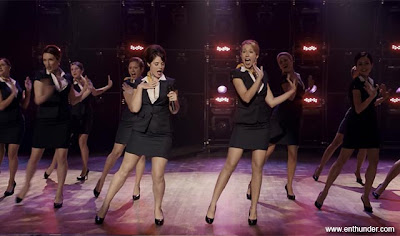 |
| The original Bellas are uniform in appearance and skin tone. |
As the two matriarchs of the group–Chloe (Brittany Snow) and Aubrey (Anna Camp)–recruit young women to audition at the back-to-school activities fair, Aubrey makes it clear that they are looking for women with “bikini-perfect bodies.” Chloe responds quietly with “How about we just get good singers?” Thus begins the Bellas’ journey into a new world filled with women of color, overweight women, “alternative” brunettes with lots of eyeliner and lesbians.
Aubrey remains steadfast in her traditionalism until almost the bitter end. Her insistence on the value of tradition, and how it’s always been and how they’ve always looked, could represent second-wave feminism, which was criticized for its lack of inclusion for women of color and lesbians.
The protagonist in the film, Beca (Anna Kendrick), desperately wants to be in LA to be a DJ, but is stuck at Barden University because her father is a professor there and she has a free ride (we’ll get to that in a minute, too). She represents third-wave feminism, which has been criticized for a lack of female camaraderie and a disregard for the past.
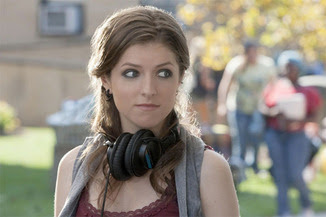 |
| Beca as the “alternative” girl (black nail polish is a dead giveaway). |
Pitch Perfect, on its surface (and even mostly below the surface), is a fun female-centered comedy with good music. It’s clearly co-produced by a woman (Hollywood feminist Elizabeth Banks) and written by a woman (30 Rock and The New Girl’s Kay Cannon). However, a feminist reading of the film suggests that far below the surface, viewers can take the plot of the film as an allegory of second- and third-wave feminism in America.
The new members of the Bellas see early on that they have no chance of winning with their old routine. They learn it, they go through the motions, but it simply doesn’t work. Aubrey stands firm in the old choreography–she becomes more and more uncomfortable with the concept of changing their form, no matter how “tired” it is.
When the group arrives at their first competition of the season, the commentators (Gail, played by Banks, and John, played by John Michael Higgins) comment on their looks. “This does not look like the fresh-faced nubile Bellas…” John says. They are “refreshing, yet displeasing to the eye,”says Gail. (The interplay between these two judges provides some great one-liners throughout the film.)
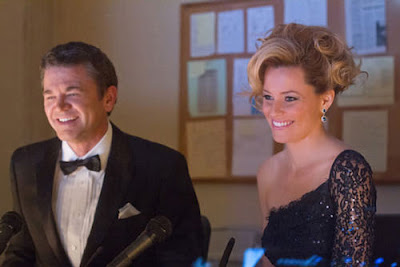 |
| John and Gail provide funny, and poignant, Christopher Guest-style play-by-plays. |
The Bellas get on stage and perform the same, tired routine. Toward the end, however, Fat Amy (yes, we’ll get to that in a minute) shakes things up during her “Turn the Beat Around” solo, ripping off her jacket and growl-singing the once demure lines. The audiences and the judges love it, and they manage to place. At regionals, Beca sees the audience getting bored and injects some mash-up vocals toward the end of their set (“Titanium,” a bullet-proof anthem that weaves its way throughout the film). The audience enjoys it, but Aubrey is enraged and kicks her out.
The group suffers, but they have to pull it together because they need to perform at nationals after another team was disqualified. Beca comes back, and tells the fractured group, “I’ve never been one of those girls who had a lot of friends who were girls–now I do, and it’s pretty cool.” Aubrey hands Beca the reigns, and they perform Beca’s own mash-up of modern and older songs. She has been turned on, at first reluctantly, to The Breakfast Club by her love interest, Jesse, and includes “Don’t You (Forget About Me),” by Simple Minds, and also includes tween anthem “Party in the U.S.A.” Notably, Fat Amy interjects a line from “Turn the Beat Around” at the climax of their set.
The women have collaborated, and evolved. They’ve kept their individualism, and been frank about their desires and motivations. They dress differently, and they sing new music. However, they don’t leave the past in the dark, and become better and closer when they decide to move forward. At the end, they’re not dressed like one another, they don’t look the same, and they win (on stage and off).
As with the social movement, the film isn’t without its problematic aspects, which ultimately speak to the current state of feminism in our culture.
Gross-out humor: The Bellas are humiliated on the national stage at the beginning of the film when Aubrey projectile vomits on the stage and audience. Later, during the Bellas’ “let it all out” moment that brought them back together, Aubrey does it again. One member gets pushed into it, and makes a snow angel in it. Is this necessary? Was there no other way to symbolize Aubrey’s anal, yet out of control, nature? These scenes felt exactly like the gross-out scenes in Bridesmaids, which were written in by Judd Apatow to appeal to the male viewer. Women, at this point, surely have proven that they’re funny, and that women’s stories can be universally entertaining. OK, maybe we’re not there yet, but the only way into the boys’ club doesn’t have to be to play exactly like them. It’s not a matter of being prude, it’s simply a matter of these scenes–Pitch Perfect‘s vomit or Bridesmaids‘s diarrhea–feeling utterly out of place in the films. What could be more appropriate, and Pitch Perfect does enter into this territory, are jokes about gynecological visits or Gail’s college group, which was called the “Menstrual Cycles.”
Fathers as idols: Yet again, we have multiple narratives of influential fathers and absent mothers. Beca’s father is the most prominent, as he is a literature professor at BU. Beca is surly and angsty toward him, and references her “stepmonster” and his divorce from her mother, yet doesn’t talk about her mother. Even when she goes to her father during spring break and they bond over tea, it’s all about him. He visits her in her dorm room more than once, which feels awkward, and clearly controls her future (bargaining with her that he’ll send her to LA after one year at BU). Aubrey, in the transformative scene where the Bellas bond, says that “My father always said, ‘If at first you don’t succeed, pack your bags.'” The two characters who most clearly represent the old and the new, in regard to the feminist movement allegory, are driven and inspired/controlled by their fathers. This trope is relentless with female protagonists–fathers are almost always more visible and more important than the characters’ mothers. This consistent story line makes sense if we examine opportunities for men and women in the decades leading up to these young women’s formative years. Girls are taught they can be anything, and too often it’s the man of the house who is represented as powerful, in work and at play. They are who are to be emulated in this culture.
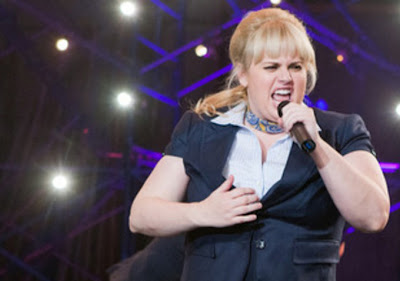 |
| Fat Amy is a star performer on stage and off. |
Fat acceptance: Fat Amy (played by the the amazing Rebel Wilson) introduces herself as Fat Amy to Chloe and Aubrey at the activities fair so “twig bitches like you don’t do it behind my back.” Although jokes are made about her size (by her and by others), Amy has solos, sex and friends. Her body is used for comedy, as is the fat body of the male sidekick of the college’s a cappella organizer. It’s still acceptable in our culture to demonize and discriminate against people who are overweight (or use them as comic relief). Amy’s character skewered that with humor (while also reaffirming it), but audiences seem really happy to see a woman of size on screen. While these casting decisions provide great fodder for entertainment writers (and who doesn’t love clever word play: “In a sea of size-0 starlets, Wilson has the confidence of a performer twice her age and half her size”). While some coverage is obviously cringe-worthy at best and fat-shaming at worst, reviewers (and certainly feminists) are embracing this representation. Even if representation is problematic, or has “mixed messages,” it’s representing reality. Would it be believable to have a fat woman on screen and no one comment on it? Unfortunately, we’re not at that point yet.
Race issues: From early on in the film, the portrayal of Asian women is problematic. Beca’s roommate is Korean, and tinkers with a bonsai tree while quietly, solemnly glaring at Beca. She only opens up when around her Korean peers (although she does seem to warm to Beca toward the end of the film). She scowls one evening, “The white girl is back,” when Beca gets back to her room. The Bellas also have a Korean member, who is awkward, speaks in a muted whisper (and when she is audible she’s saying strange things) and only really opens up during their last number. There’s no clear defense for these character portrayals, but they do seem to line up with what’s happening in the greater world of entertainment and feminist conversations even in 2012. Visit the comments section on a feminist blog defending Girls (or simply read about the show’s problematic history). Too often the face of third-wave feminism–especially the early 20s crowd–is white and privileged. This is in lock step with second-wave feminism, which caused a rift with women of color (Alice Walker claimed the title “womanism” because of this), and even first-wave feminism, when early suffragists used racism to further their cause. It was a problem then, and it’s a problem now.
Sex and sexuality: When Beca first arrives on campus, she’s handed an “official BU rape whistle” by a perky upperclassman. She warns, “Don’t blow it unless it’s actually happening!” While many reviewers found this joke tasteless, the audience can’t help but think that it’s supposed to be startling and tasteless. We’re supposed to think, “That’s insane,” and then immediately think about how “legitimate rape” has been a talking point and male legislators have had to re-write laws to change “rape” to “forcible rape.” Instead of just being offensive, that joke has the possibility of satirizing how we are discussing rape on a wide scale.
The “original” Bellas have a rule that no Bella can be romantically involved with a Treblemaker (their all-male rival group). This strict sexual gatekeeping causes them to lose members at the beginning, but Beca speaks out against the rules and continues to fraternize with Jesse (a Treblemaker). The two don’t embrace and kiss until the end, but it’s another traditional rule broken. Women don’t want male legislators policing their bodies, but they also don’t want other women doing so either (in the name of tradition and virtue, or competition with men).
The group has one member who frequently makes jokes about her sexual exploits (“dude’s a hunter,” she says of her vagina, adapting to the double standard of being a stud) and wears revealing clothing and dances provocatively. She is not punished for this, and doesn’t have to change. Even Chloe is seen showering with a young man at the beginning of the film, with no judgment.
The Bellas’ token lesbian, a black woman, is whispered about and assumed to be gay. When they are all bonding toward the end of the film, they have a moment of honesty, when the members admit to secrets about themselves. Her secret isn’t that she’s gay, but that she has a gambling problem (that started after she and her girlfriend broke up, she says cavalierly, as it’s revealed that this ex-girlfriend is also a Bella). No big deal. Even if there were whispers at first, she didn’t find that to be part of her identity worth hiding. The joke about her sexuality was ultimately on the rest of the women.
As the Bellas wow the crowd at the finals, John says, surprised, “I would never expect it from an all-female group!” Gail responds, “Well, you are a misogynist at heart.” Even with its problems, Pitch Perfect ends on a note of women’s power. John gets put in his place, and while the all-male Treblemakers don’t win, they’re all working together at the beginning of the next school year.
There are always tensions between generations, and when these generations are women who have essentially been at battle for rights and representation for hundreds–really thousands–of years, there are not going to be perfect transitions and easy paths.
Eight years ago, Bitch magazine co-founder Lisa Jarvis wrote a piece for Ms. entitled, “The End of Feminism’s Third Wave” (adapted from a speech she’d given to the National Women’s Studies Association). She adeptly breaks down the dichotomy of second- and third-wave, and argues that the “master narratives” are largely false, and no one can seem to focus on the similarities. She says:
The rap goes something like this: Older women drained their movement of sexuality; younger women are uncritically sexualized. Older women won’t recognize the importance of pop culture; younger women are obsessed with media representation. Older women have too narrow a definition of what makes a feminist issue; younger women are scattered and don’t know what’s important.Stodgy versus frivolous. Won’t share power versus spoiled and ignorant.
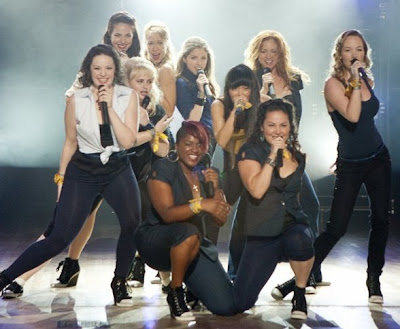 |
| The Bellas at the end break out and win. |
There are many similarities, though. And while Pitch Perfect isn’t perfect, it is not tone-deaf to feminism’s struggles, problems and potential. It passes the Bechdel Test with flying colors, and even challenges the idea of masculinity (Jesse’s roommate gushes about the Treblemakers, “That’s what being a man is all about”). The Bellas ultimately win because they blend the old with the new, and allow themselves to move past their guarded individualism and work together. At the end, the women of color get a strong voice, and Aubrey embraces the changes (and Fat Amy proudly sings, “Can you feel the passion?”).
Jarvis goes on:
We may not all agree on exactly what it looks like or how to get it. We should never expect to agree. Feminism has always thrived on and grown from internal discussions and disagreements. Our many different and often opposing perspectives are what push us forward… I want to see these internal disagreements continue. I want to see as much wrangling over them as ever. But I want them articulated accurately. And that means recognizing the generational divide for what it is — an illusion.
Jarvis’s words ring true for the larger feminist movement in 2012, and for what allows the Bellas to win the International Championship of Collegiate A Cappella at Lincoln Center.
What feminism needs now is for everyone to get on stage.
—
Leigh Kolb is a composition, literature and journalism instructor at a community college in rural Missouri.







I love the movie its so awsome
I LOVE YOU PITCH PERFECT
The racism completely derailed this movie for me.
Yeah falling back on Asian American stereotypes does not a good movie make. It wasn’t just problematic. It was the most blatant case of racist stereotyping in a film like that yet there wasn’t any real reason for it.
It was Minstrel Cycles not Menstrual Cycles
The director cheated in the shower scene! Becca’s roommate is actually North Korean. I presume that the Korean singer is South Korean.